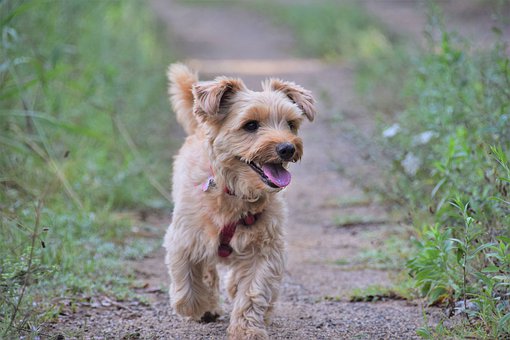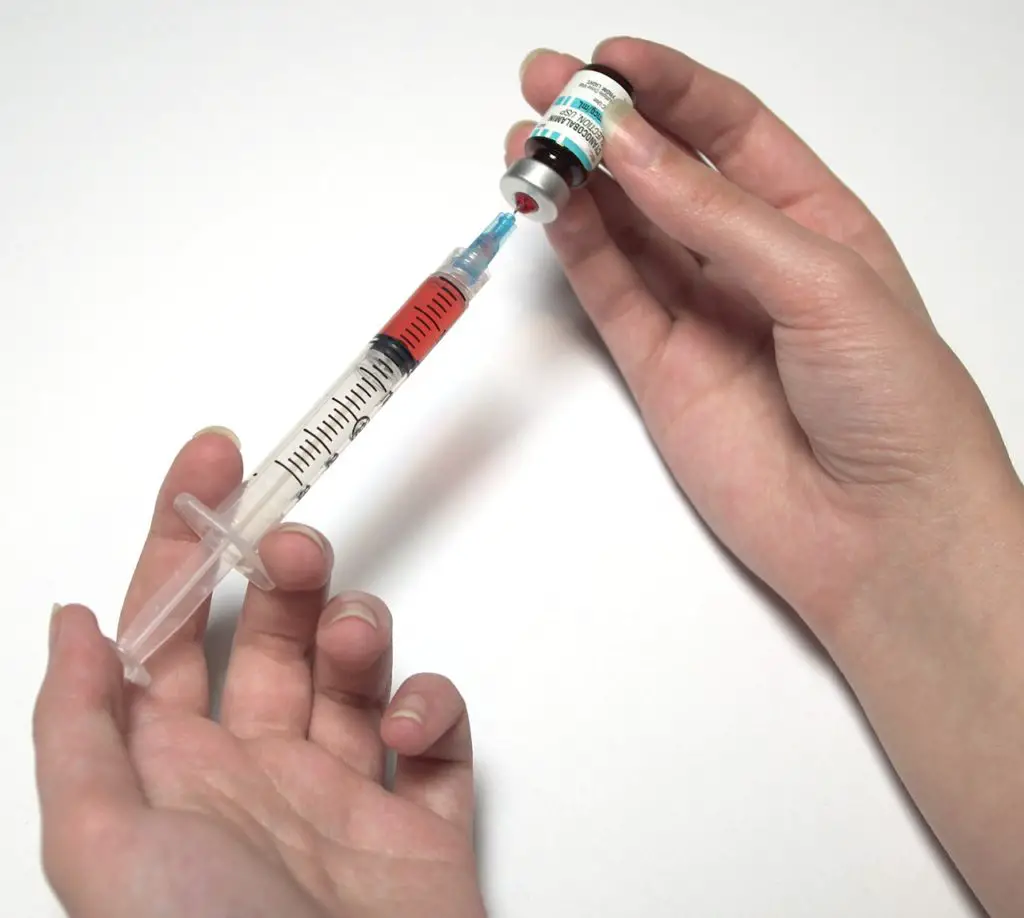Following a strict Yorkie vaccine schedule can help protect your little pet from many deadly diseases.
Your Yorkie’s good health depends on a good diet as well as the ongoing health care you provide it.
An important part of ongoing healthcare includes the vaccinations your Yorkie must receive in its first year followed by the booster shots in the subsequent years.
In this guide, we will dive deep into the complicated world of dog vaccines in a simple and easy-to-understand format.
Before we proceed, some important things to know about canine vaccines in general:
Yorkie Vaccine Schedule – Important Things to Know

- Please note that different vets follow different schedules for various vaccines, so some of the schedules/vaccines give below may not match with your vet’s.
- Some Vaccinations such as the Lyme disease vaccine and rabies vaccine also depend on your country, state, or area you live in.
Also Read: What Do Yorkies Usually Die From
Two Vaccine Types in Dogs: Core and Non-Core Vaccines

It is very important to cover this topic as you must know which the core vaccines are for your Yorkie (and all puppies in general).
The AAHA or the American Animal Hospital Association classifies canine vaccines into two distinct categories: core and non-core.
Core Vaccines
Core vaccines are the mandatory vaccines that every puppy must receive.
According to the 2017 AAHA update, core vaccines include the following:
- Canine Distemper Virus
- Parvovirus
- Parainfluenza virus
- Adenovirus -2
- Rabies
The acronym vaccine brands (and scientific community) use for these inoculations are DHPP or DA2PP-L or DA2PP-C. (Check out this guide on Dog Vaccine Acronyms to clear any confusion!)
Here, the D stands for Distemper, H for hepatitis, P for Parainfluenza and Parvovirus respectively and A2 for Adenovirus-2. The L – stands for leptospirosis while the C for the coronavirus.
The rabies vaccine is not given at an early age – we will explain this in detail later.
Also, Adenovirus-2 is also known as Canine infectious hepatitis, hence H and A2 may be used interchangeably.
Some doctors also add the Leptospirosis shot in the core vaccine (DHLPP vaccine or DA2PP-L) although the AAHA states that Leptospirosis is non-core vaccine.
Here are some of the symptoms caused by these aforementioned deadly diseases:
Distemper
The DHLPP vaccine or the DHPP vaccine protects against canine distemper. Symptoms of distemper are:
- Watery, pus-like discharge from the eyes
- Nasal discharge
- Coughing
- Lethargy
- Reduced appetite
- Vomiting
Without timely treatment, which is very expensive, your pet could die.
Hepatitis or Adenovirus 2
This is causes canine jaundice with the following symptoms:
- Fever
- Depression
- Weight loss
- Loss of appetite
- Yellow eyes, ears, gums, and skin
- Vomiting
- Diarrhea
- Swelling in the head and neck
- Excessive thirst and urination
Canine Parainfulenza
The core vaccine also includes a vaccine for preventing canine para-influenza. The symptoms for this are:
- Dry hacking cough
- Lack of appetite
- Eye inflammation and discharge
- Sneezing
- Depression
- Lethargy
Canine Parvovirus
This is a deadly disease that is also highly contagious. It can quickly ravage an infected dogs body and death can occur within days, without the proper treatment.
- Bloody diarrhea
- Eye discharge
- Bloating
- Fever
- Complete lack of appetite
- Lethargy
- Abdominal pain and bloating
Rabies
Rabies is a core vaccine given at the age of between 12 and 24 weeks. Before this age, a little puppy’s body won’t be able to handle the vaccine.
Also, rabies is more or less eradicated in the United States. That is why, vets assume that your pet won’t be coming in contact with rabid dogs that could transmit the disease.
Having said, vaccination against rabies is still very important since wild animals can carry this disease (foxes, bats, rats, raccoons, etc.). Symptoms of rabies are:
- Changes in behavior and attitude
- Paralysis
- Weakness
- Seizures
- Excess salivation or foaming at the mouth.
- Loss of appetite
Non-Core Vaccines
As stated earlier, vaccine brands sometimes include Leptospirosis vaccine with the core vaccines for DHPP.
Non-core vaccines are the non-mandatory vaccines. This means that your Yorkie would receive them if your vet thinks it is at a risk for the following diseases.
Leptospirosis
Several strains of bacteria and viruses can cause leptospirosis in dogs. As a result, one vaccine may not be able to protect your pet from this deadly disease.
However, it is still better to get this vaccine as it could considerably reduce the severity of symptoms.
- Shivering
- Fever
- Increased thirst
- Dehydration
- Vomiting
- Diarrhea
- Loss of appetite
- Jaundice
- Painful inflammation within the eyes.
Lyme disease vaccine
Lyme disease vaccine is optional and your vet might consider it if you live in a tick-infested area or there have been Lyme disease cases detected in your state recently.
The disease is caused by tick bites and can cause the following symptoms:
- Many dogs show no signs at all
- Some may develop red ‘target’ like bite mark on the skin(red dot enclosed by a red ring)
- Fever
- Lack of appetite
- Painful and swollen lymph nodes
- Lethargy
Bordetella
Sometimes referred to as canine kennel cough vaccine, the Bordetella vaccine is also optional and given to pets that are to be boarded in kennels or pet hostels.
Since the disease is highly contagious, some pet hostels and boarding facilities demand proof of Bordetella vaccination (within the last 6 months) in case you plan to board your Yorkie with them.
As with Lepto, Bordetella is caused by various bacterial strains. As a result, a single vaccine may not offer 100% protection to vulnerable dogs.
This vaccine is available as a nasal squirt as well as an injectable.
Signs of bordetella are:
- Loud unmistakable honking cough
- Runny nose
- Sneezing
- Loss of appetite
- Lethargy
- Fever.
Canine coronavirus
Canine coronavirus is a highly contagious disease in dogs. It primarily attacks the intestinal tract.
Some vaccines for canine coronavirus are included in the distemper, adenovirus, and parvovirus vaccines.
Symptoms of canine coronavirus
- Fever
- Vomiting
- Loss of appetite
Now that we have covered the core and non-core vaccines, let us consider a week-by-week Yorkie vaccine schedule:
Week-by-Week Yorkie Vaccine Schedule with Approximate Costs
| Yorkie’s age | Core vaccine | Non-core vaccine | Approximate cost** |
| 6 to 8 weeks | DHPP vaccine (distemper, canine hepatitis, para-influenza, and parvovirus.) | Leptospirosis and optional measles and bordetella | Core vaccines cost between $75 and $100. Additional vaccines can cost between $20 and $50 each |
| 10 to 12 weeks | DHPP | Canine coronavirus, Leptospirosis, Bordetella and Lyme disease | Core vaccines cost between $75 and $100. Additional vaccines can cost between $20 and $50 each |
| 12 to 24 weeks | Rabies | $15 to $20 | |
| 14 to 16 weeks | DHPP | Coronavirus, Leptospirosis, Bordetella, and Lyme disease boosters | Core vaccines cost between $75 and $100. Additional vaccines can cost between $20 and $50 each |
| 12 to 16 months ** Costs vary from state to state and depend on the vet practice | Rabies and DHPP boosters | Canine coronavirus, bordetella, Lyme disease, and leptospirosis boosters | Core vaccines cost between $75 and $100. Additional vaccines can cost between $20 and $50 each |

6 to 8 weeks
Your Yorkie will receive a single shot (DHPP) that will protect it against: distemper, canine hepatitis, para-influenza, and parvovirus.
You can discuss the Leptospirosis vaccine with your vet.
As stated earlier, some doctors might give your Yorkie the DHLPP/DA2PP-L or DA2PP shot in this period. The latter is the same as DHPP while the former includes the Leptospirosis shot.
Also, some doctors include measles and bordetella shots as well.
10 to 12 weeks
Four weeks after your Yorkie has received the first DHPP or the DHLPP shot, you need to bring it in again for its boosters.
The booster shots for your Yorkie in this period are: distemper, canine hepatitis, para-influenza, and parvovirus.
In addition, your pet might also receive the Coronavirus shot, booster for Leptospirosis, (or the Lepto shot if it wasn’t given in the earlier round), booster for Bordetella and the shot for Lyme disease prevention.
12 to 24 weeks
This is the time when your vet will give your Yorkie the rabies shot.
14 to 16 weeks
This is when your Yorkie will get the DHPP booster as well as the boosters for Coronavirus, Leptospirosis, Bordetella, and Lyme disease.
12 months to 16 months
At this time, your Yorkie should receive the rabies booster shot along with boosters for DHPP (distemper, hepatitis, parvo virus, and parainflenza.)
Your Yorkie will also get its boosters for Canine coronavirus, bordetella, Lyme disease, and leptospirosis.
Congratulations! Your Yorkie is now inoculated against many deadly canine diseases.
Every 1 to 2 years or every 1 to 3 years
Your vet will provide your Yorkie with boosters for DHPP or (distemper, hepatitis, parvovirus, and parainfluenza), rabies, Canine coronavirus, bordetella, Lyme disease, and leptospirosis.
Also Read: Best Food for Yorkie Puppy
Adult Yorkie Vaccination
If you have adopted an older Yorkie, then the adoption shelter should provide you with all necessary records of its vaccinations.
In case you do not have said records, you could discuss with your vet regarding the shots it needs.
In most cases, vets would suggest giving the DHPP booster shot as well as rabies and Leptospirosis vaccines. If you live in a tick-infested region, then Lyme disease vaccine is also needed.
What are Possible Yorkie Reactions to Vaccine?

Here are three common side effects or Yorkie reaction to vaccine:
Lethargy
In the hours following the vaccination, your Yorkie puppy might not be its usual playful self. It may be lethargic and could experience some aches, pains, and soreness.
Lumps
Some dogs develop a big lump or bump in the site of the injection. Keep an eye out on the area: it should not start oozing pus or worsen over the next few days.
Sneezing/coughing/runny nose
Often, the Bordetella nasal squirt could lead to these symptoms. Intranasal vaccines do cause excess sneezing and runny noses in some Yorkies.
Fortunately, most dogs return to their normal lively selves within a day or two.
If symptoms persist, or worsen or your pet starts shivering, vomiting, runs a fever, develops an abscess, or experiences seizures, then please see your vet right away.
Also Read: Best Dog Food for Yorkies with Allergies
Are Vaccines Necessary for My Yorkie? What if I Choose Not to Vaccinate It?

Many pet parents decide not to vaccinate their dogs thinking that their natural immunity will help prevent all of the above deadly diseases.
While many dogs do live long healthy lives without vaccines, you are putting your pet at an unnecessary risk.
If you want to socialize your Yorkie with other pets, you live in high-risk areas where the above diseases are prevalent, or plan to board it from time to time, then it is important that you at least get your Yorkie vaccinated with the core vaccines.
To reiterate: core vaccines are the mandatory vaccines including ones for rabies, distemper, hepatitis, parvovirus, and para-influenza.
Some states have made these core vaccines mandatory. Moreover, most dog obedience schools and pet boarding facilities demand to see the records of these vaccines before allowing your pet in.
Without vaccinations, you are exposing your dog to the risk of contracting the above diseases and also putting other dogs in its vicinity at risk.
Also Read: Are Yorkies Easy to Train
FAQs on Yorkie Vaccine Schedule

1. When should Yorkie puppies get their first shots?
Yorkie puppies, like all other puppies, should get their first shots between 6 to 8 weeks.
Good breeders will get their puppies vaccinated with the core vaccines like DHPP (distemper, hepatitis/adenovirus, parvo-virus, and para-influenza).
2. Do puppy shots have to have 3 weeks of gap in between?
Yes, it is advisable that there be a gap of 3 to 4 weeks between the first shot and the booster shot.
3. Can my Yorkie pup go to the dog park after its second set of shots?
Most vets recommend taking young pups out to socialize with other dogs only after the 17th week (assuming that your puppy has had its DHPP booster at 16th week (and waiting one more week just as a precaution).
4. Can my Yorkie get parvovirus despite its first shot?
Yes, dogs are always at a risk of parvo and other viral infections because there are many different strains that can cause them.
However, vaccination greatly reduces your pet’s risk to contracting the disease, and even if it does contract it, the symptoms would be much milder than they would be in an un-vaccinated dog.
5. Is a small dog vaccination schedule different than those for the larger dog breeds?
No. All dogs have more or less the same vaccine schedule.
In fact, all dogs, irrespective of their sizes, get the same volume of vaccine – whether it is a 5 lb. Yorkie or a 200 lb. mastiff.
Conclusion – Yorkie Vaccine Schedule
A Yorkie vaccine schedule will tell you exactly when your Yorkie needs its shots.
In general, a Yorkie puppy aged between 6 and 8 weeks can receive its DHPP shot. These are the core vaccines for distemper, hepatitis, parvo virus, and para influenza.
It may also receive a shot for Leptospirosis, bordetella, and rabies in subsequent weeks and months.
Additionally, you need to take your adult Yorkie every 1 or 3 years for its booster shots. Discuss with your vet about the exact Yorkie vaccine schedule.


